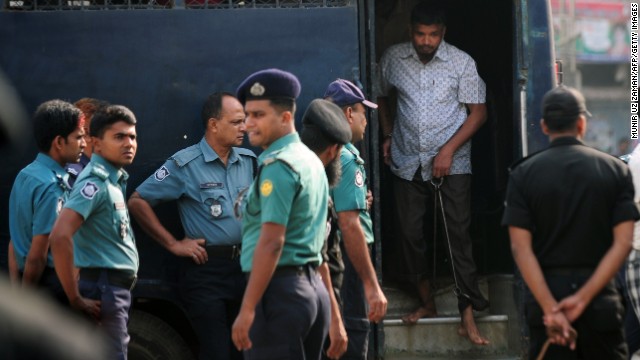
Dhaka, Bangladesh (CNN) -- More than 150 soldiers in Bangladesh were sentenced to death Tuesday for murder, rape and arson during a 2009 mutiny. "The convicts will be hanged by the neck until death," ruled Mohammad Akhteruzzaman, a senior judge at the Dhaka Metropolitan Sessions Court, in pronouncing the sentences for the 152 paramilitary border guards. Seventy-four people, including 57 army officers, were killed in the mutiny at the headquarters of Bangladesh's border guards in Dhaka in February 2009.
Investigators initially brought charges against 850 people, including 23 civilians, but the final judgment was against 846 people. Four suspects died in custody.
The accused troopers were indicted on charges of murder, rape, arson, looting weapons and conspiracy.
"We had long been waiting for the verdict and it has cleansed the image of the force stained by the massacre," said Maj. Gen. Aziz Ahmed, who now leads the border guards.
Several thousand armed soldiers of the Bangladesh Rifles (BDR) unit took control of their own headquarters in the capital for two days and massacred scores of people, including officers of the Bangladesh Army who were stationed with the BDR.
The civilians in the case include a former lawmaker from the opposition Bangladesh Nationalist Party, Nasiruddin Ahmed Pintu, and an Awami League leader, Torab Ali.
State prosecutor Mosharrof Hossain Kazal told CNN that 161 people, including Pintu and Ali, were sentenced to life in prison.
A total of 262 people were sentenced to prison terms ranging from three years to 10 years and 271 were acquitted of the charges against them.
"We may appeal against those who were acquitted," Kazal said.
Shamim Sardar, an attorney for one of those sentenced Tuesday, told reporters justice had not been done and vowed to appeal to a higher court.
The mutiny erupted less than two months after the present Awami League government -- led by Prime Minister Sheikh Hasina -- came to power in January 2009 in a landslide victory.
According to the charges, the border guards took up weapons, killed the officers, and held the families of the officers hostage in the staff apartments inside the headquarters compound.
The dead also included the then-chief of the border guards, Maj. Gen. Shakil Ahmed, and his wife.
The soldiers demanded better pay and perks, as well as the withdrawal of all army officers from the forces.
The government later renamed the BDR the Border Guards of Bangladesh. The prime responsibility of the force, which works under the ministry of home affairs, is to guard the country's 4,000-kilometer (2,485-mile) border with India and Myanmar.
No comments:
Post a Comment